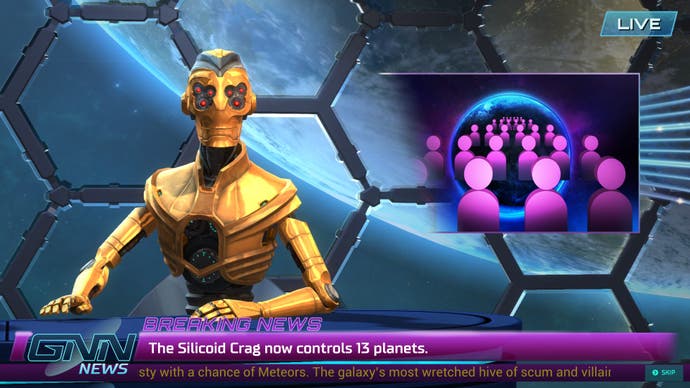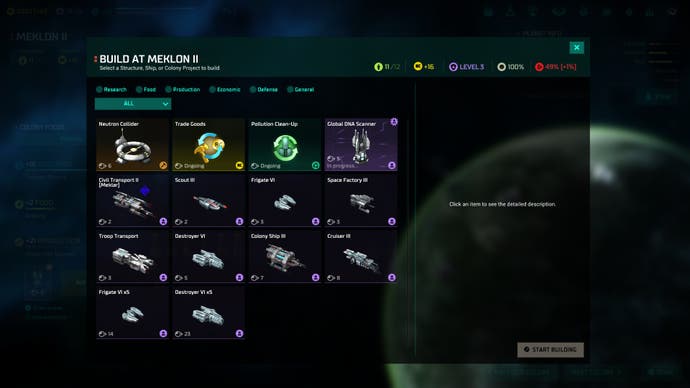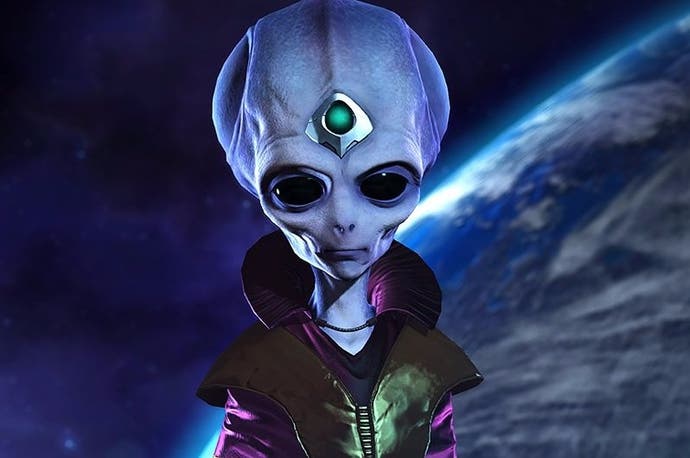Master of Orion review
Groundhog game.
1993 was a splendid year for PC gaming - perhaps the very best there's been - with Dune 2, Syndicate, X-Wing and Myst all establishing or championing their respective genres. Today of course we're teased flickers of X-Wing in the forthcoming Star Wars Battlefront DLC and with Obduction, released just last week, Cyan Worlds is seemingly back to its old Myst tricks. More substantially we've had a remastering of Day of the Tentacle, a rebooting of Doom and now this re-imagining of strategy classic Master of Orion - surely the most persistent of all the genre titans that were there to witness the birth of the Atari Jaguar.
If you're not aware of the importance of Master of Orion you're clearly not a fan of the 4X genrette that MOO has been singularly inspiring - almost stiflingly so - ever since it was first released. Like Doom it wasn't the first of its kind (most would attribute that to 1983's Reach for the Stars), but coming off the back of Sid Meier's Civilization, it was the first to set firm the ideals of interstellar empire building: explore, expand, exploit, expunge.
As with Sid's Civ, the 4X "Civ in space" formula hasn't fundamentally changed much since the 90s, just had more stuff added; more planets and peoples to discover, more elaborate tech trees and diplomacy dialogue, more bits and bobs from which to design an armada, etc. In recent years there have been laudable attempts at implementing 3D, at cramming in real-time battles and trying to nail multiplayer for a genre that has a notoriously high drop out rate. Yet in spite of all the tweaks and upgrades, what is more curious is that frequently a 4X developer has cited MOO's inspiration as if it were a feature of the game rather than mere design contemplation - more so than any FPS studio would enthuse about Doom or Quake - which goes to prove what a significant hold Simtex's game has had. Unfortunately, with the name now reassigned to NGD's release, Master of Orion can no longer command quite same level of reverence, at least not without alluding to the original.

That's not to say modern Master of Orion is bad, just that by virtue of being a remake the innovations of the source material have been buffed out of existence, while any departures of it's own are so minor as to be invisible. There is in spite of this a great deal to recommend. In an era in which many of the dominant space strategy games are notoriously convoluted, terribly interfaced and almost gleefully vexatious to genre novices, the new MOO cuts a bold and contrasting figure, with an interface that is uncluttered and a choice of races adapted from the original game that, in spite of being somewhat conventional (lizard-men, insectoids etc) are immediately inviting, presented as they are by full-screen fully-voiced animations rather than via dreary postage stamps-sized art set within puffy text boxes.
For a turn-based game it clips along at quite a rate too: You can click through 100 turns, explore half the map and waft through a third of the tech tree before the cup of tea you forgot you'd made has gotten cold. When poor decision making can often be a barrier to replayability, the low time investment required to get a foothold in a game means restarts are not nearly as deflating as might be expected.
The problems start to become evident once you have scrapped a couple of games and you realise that while the game's ten races look and sound different, there's not a great deal within the game mechanics that offers much distinction, especially with one shared tech tree and not a vast amount of deviation allowed to flow from it. You can of course focus your efforts on chasing a military victory over an economic or technological one, with some races predisposed to achieving one over another, but all too frequently you will be chasing the same technologies and thus adopting the same strategy, thus it is that one play through can quite easily be the same as the one preceding it, with very little wriggle room to strategise outside the box.
Likewise the various planets and the facilities that can be built across them require you to balance resources towards managing population growth, production and completing research tasks, but often the focus is more based on your overall objectives as opposed to optimising each colony. To be fair this is true of most like-minded games, but the fewer variables to tinker with make player choice seem more constrained than is usual. In short, the more you play the more the races feel indistinguishable, which rather diminishes the desire to keep plugging away at them.

What sets new MOO aside in gameplay terms from the competition, and from it's predecessors, are the real-time battles, which if you choose to avoid an automated outcome will kick in whenever two fleets meet. Reminiscent a little of Total War's real-time tactical interludes, players are able to plot waypoints for ships, set their speed and prioritise weapons, theoretically allowing a skilled fleet commander to overcome odds that might be overwhelming if auto-resolve was selected. Most of the time the side with most biggest ships will win out, as might be expected, but it often pays to assemble a balanced force and lead a flanking charge during any decisive encounters, if only to offset some of the damage you'll otherwise be forced to accrue. Unfortunately whilst the real-time battles are welcome and suitably brief, the enemy AI isn't exactly Sun Tzu and the battles are considerably less evolved and far less arresting than in either Stellaris or Sins of a Solar Empire, but clocking in at just a couple of minutes each the battles go a long way to breaking up the main body of the game even if they don't always augment it.
Perhaps the biggest deviation from the original game is the starmap across which the game is set, NGD favouring planetary systems linked by warp lanes as opposed to a more traditional hex or tiled map across which fleets are able to plot their own interstellar path. Given how much effort has been spent on making the game accessible and fast-paced, it's understandable why the devs have featured a map that funnels the action towards predisposed choke points, rather than allowing players to decide on where to focus their forces. MOO purists have been critical of the decision since the game first hit Early Access, but it actually fits the nature and pace of the game well, allowing for larger invasion fleets to mass and clash regularly. Together with a spying mechanic that requires agents to be travel around and a fairly detailed web of diplomatic options, the scope for conflicts to escalate quickly and for allies to become enemies helps brighten the tactical palette even if the range of color is limited.

Master of Orion feels like it's been designed more for tablets than for the PC. Not a bad thing if such a conversion was being considered since the game would be virtually unopposed, but its simplicity of design, accessible though it is, feels oddly lightweight when lined up against the competition that dominates the genre on PC. Ultimately though, as well as being a breezy tribute act to Simtex's original, the new Master of Orion succeed as a gateway game for the 4X genre, a fine introduction for those who may be curious as to the attractions of being a space Hitler or a galactic Gandhi, but not a game that offers much for those who may want to take their interest a step further. Real-time battles and instant accessibility aside, Galactic Civilizations III pretty much does everything better, while the more recent Stellaris (itself a gateway to a universe of Paradox titles) offers a much more rounded and thoughtful experience, in spite of its comparatively dour exterior.
Compared to the more involved and evolved games that the original MOO inspired and to which lifelong genre fans have gravitated - the likes of Distant Worlds and Star Ruler - NGD's efforts will fuel some nostalgia, perhaps cause the odd tear to swell in the corner of an eye, but ultimately the game is too trifling, too willing to compromise accessibility for depth, and thus is a missed opportunity to push a beloved set of foundations forward after so many years buried in the past. As welcome as it is to receive a new Master of Orion, it follows a route that its many predecessors and spiritual successors have already been down.
